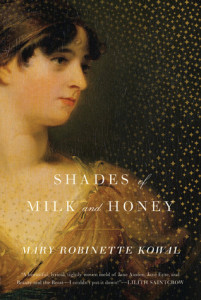 On the one hand, yes, this was fun because Jane Austen + magic = yes. If you go into the book expecting Jane Austen levels of wit and social satire, you are going to be disappointed. But I didn’t. I went in expecting a fantasy novel set in an Austen-like world with an Austen-like romance plot, and so I was fine. And the magic system was really interesting to me.
On the one hand, yes, this was fun because Jane Austen + magic = yes. If you go into the book expecting Jane Austen levels of wit and social satire, you are going to be disappointed. But I didn’t. I went in expecting a fantasy novel set in an Austen-like world with an Austen-like romance plot, and so I was fine. And the magic system was really interesting to me.
So basically, this is Regency England if magic were real, and largely considered another art, just like music and painting and dancing, and one that is a concern for the ladies, rather than menfolk. This intersection of domesticity and femininity and art was something I found really interesting! And the magic itself was really cool in execution. Our main character, Jane, is talented at the art of glamour, as it’s called, which is mostly used to create three dimensional, moving art for the senses (including movement, smell, and sound). One of the main reasons I will be continuing the series, despite some pretty significant flaws in this book, is because of the magic system.
On the other hand, Jane is insufferable for large portions of the novel, when clearly she isn’t meant to be. Jane being insufferable is entirely a writing issue. I know we are meant to sympathize with her, “Plain Jane” the spinster, with the beautiful sister and no marriage prospects because NO ONE COULD POSSIBLY LOVE HER HOW PLAIN. And the thing is, I WANTED to. And I did, for about the first third of the novel. See, Jane is twenty-eight, which is basically fifty in Regency years. She is plain, with a long nose, but very talented at music and art and glamour. She also has an unrequited thing for her neighbor, Mr. Dunkirk, who seems to have a thing for her beautiful sister, and whom her sister likes in return. Her father will settle a nice sum of money upon her if she were to marry. Like in Pride & Prejudice, the Austen novel this one most resembles, her family’s home is entailed, meaning it can only pass to male heirs. (I sort of wish this detail had been left out, as Kowal doesn’t really do anything with it, whereas in P & P, it’s crucial to understand why the Bennet matriarch is so set on her daughters marrying.)
Anyway, my point is, Jane is inherently likable! It really should have been super easy to keep us on her side. Unfortunately, she spends so much time being flat-out stupid it becomes very difficult. Only the most oblivious of readers and characters could fail to miss that Dunkirk doesn’t give two shits about Melody, instead having a thing for Jane. He’s always talking to her and ignoring Melody, he makes excuses to see her, invites her on walks and horseback rides with his sister, encourages her friendship with his sister, tells her explicitly that what he desires is a woman who can make his house seem like a home with her glamour, etc. etc. Melody even leaves the room and pouts for extended periods of time and Dunkirk doesn’t notice. He shows almost no interest in her, save when she’s injured. But it never once crosses poor Jane’s mind, not even for an instant, that she could be the one he likes. Instead, she spends inordinate amounts of time being viciously jealous of her sister for having Mr. Dunkirk’s favor, when their is LITERALLY no evidence of this, except Jane thinking she is so unworthy of male attention. Her sister is also viciously jealous of Jane’s talent, and resents only being a pretty face, and when she expresses this sentiment to Jane, Jane dismisses it as false because she can’t comprehend why her sister would ever feel like that. It was a huge waste of story and character in almost every respect.
The rest of the novel is just as uneven, with fun things balanced out by problems. For example, Jane’s relationship with the passionate glamourist Mr. Vincent is pleasing, but there isn’t nearly enough of it. At the end when SPOILERS he proposes and she accepts with such joy, a lot of my being happy was there only because I wanted it to be, and not because the book had earned it. Kowal put more effort into developing Jane’s relationship with Dunkirk’s sister, Beth, than she did Jane’s love interest END SPOILERS. The ending came out of nowhere.
It was also sloppy as hell, everything wrapping up lightning fast and cheesy (the book was clearly written as a standalone and expanded into a series only after the fact). I also didn’t like the strange turn the story took once a character’s true motivations had been realized. If this book was really a Jane Austen homage with magic, that whole thing with SPOILERS the gun and the violent standoff END SPOILERS should never have happened. Jane Austen plots are resolved with talking, not fighting.
Anyway, this book was a mixed bag, but it was a quick read, and overall I think my pleasure in reading it was outweighed by my annoyances. I will continue the series, and hopefully now that she’s got the marriage plot and Austen homage out of the way, she can get on with building her own story world where her characters won’t have to act like dum dums.
